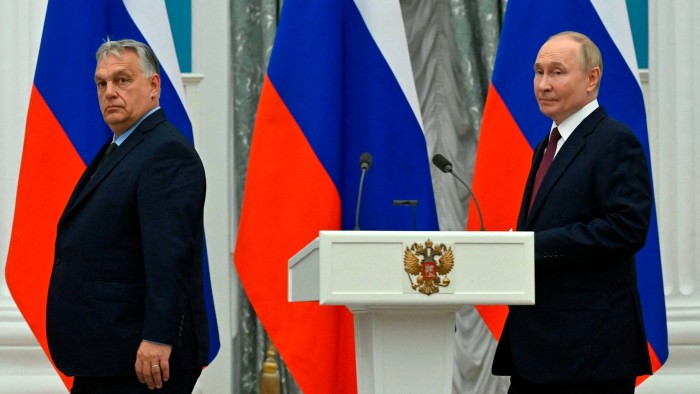EU renews Russia sanctions after Hungary lifts veto threat

Unlock the Editor’s Digest for free
Roula Khalaf, Editor of the FT, selects her favourite stories in this weekly newsletter.
The EU has agreed to renew its sanctions against Russia after Hungary dropped its veto threat. The decision comes after statements by the Trump administration that it would not roll back US restrictions imposed on Moscow in response to its war in Ukraine.
Viktor Orbán, Hungary’s Russia-friendly prime minister, had threatened to let the EU sanctions lapse at the end of the month if US President Donald Trump decided to relax the sanctions regime. But Trump last week said he was willing to impose additional restrictive measures if Russia did not reach an agreement to end the war “soon”.
On Monday, Hungary’s foreign minister Péter Szijjártó agreed to the EU extending the sanctions, according to three officials. The sanctions, which must be extended every six months by unanimous agreement, include the freezing of €190bn worth of Russian assets in the EU.
“Europe delivers: EU foreign ministers just agreed to extend again the sanctions on Russia,” said Kaja Kallas, the EU’s chief diplomat. “This will continue to deprive Moscow of revenues to finance its war. Russia needs to pay for the damage they are causing.”
Orbán last week had linked the rollover of sanctions to Ukraine resuming Russian gas transit, as well as safeguarding the last remaining pipelines still carrying Russian oil and gas to Europe from Ukrainian drone attacks.
A gas transit deal between Ukraine and Russian state-owned giant Gazprom came to an end on January 1. While the move was largely anticipated, it caused uproar in Hungary and Slovakia, two landlocked countries most reliant on gas imports from Russia, and with the most Russia-friendly governments in the EU.
On Monday the European Commission agreed in a statement seen by the Financial Times to “continue discussions with Ukraine on the supply to Europe through the gas pipeline system in Ukraine”, involving Hungary and Slovakia in the process, as well as to “approach Ukraine to request assurances regarding the maintenance of oil pipeline transfers to the EU”.
Szijjártó said on X that Hungary had “received the guarantees it has requested concerning the energy security of our country”.
https://www.ft.com/__origami/service/image/v2/images/raw/https%3A%2F%2Fd1e00ek4ebabms.cloudfront.net%2Fproduction%2Fd5f43961-d925-4f4e-85fc-b4daf81b4931.jpg?source=next-article&fit=scale-down&quality=highest&width=700&dpr=1
2025-01-27 05:56:44




